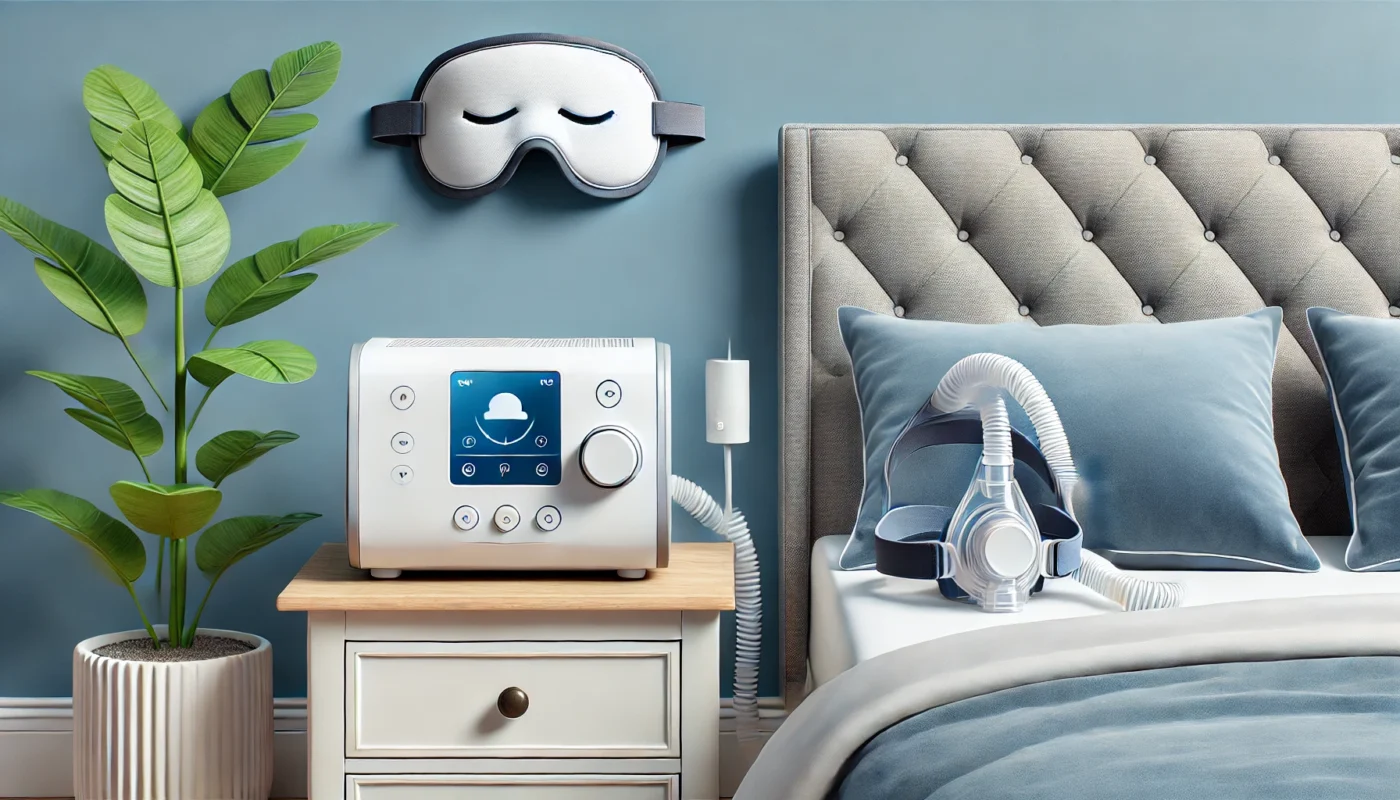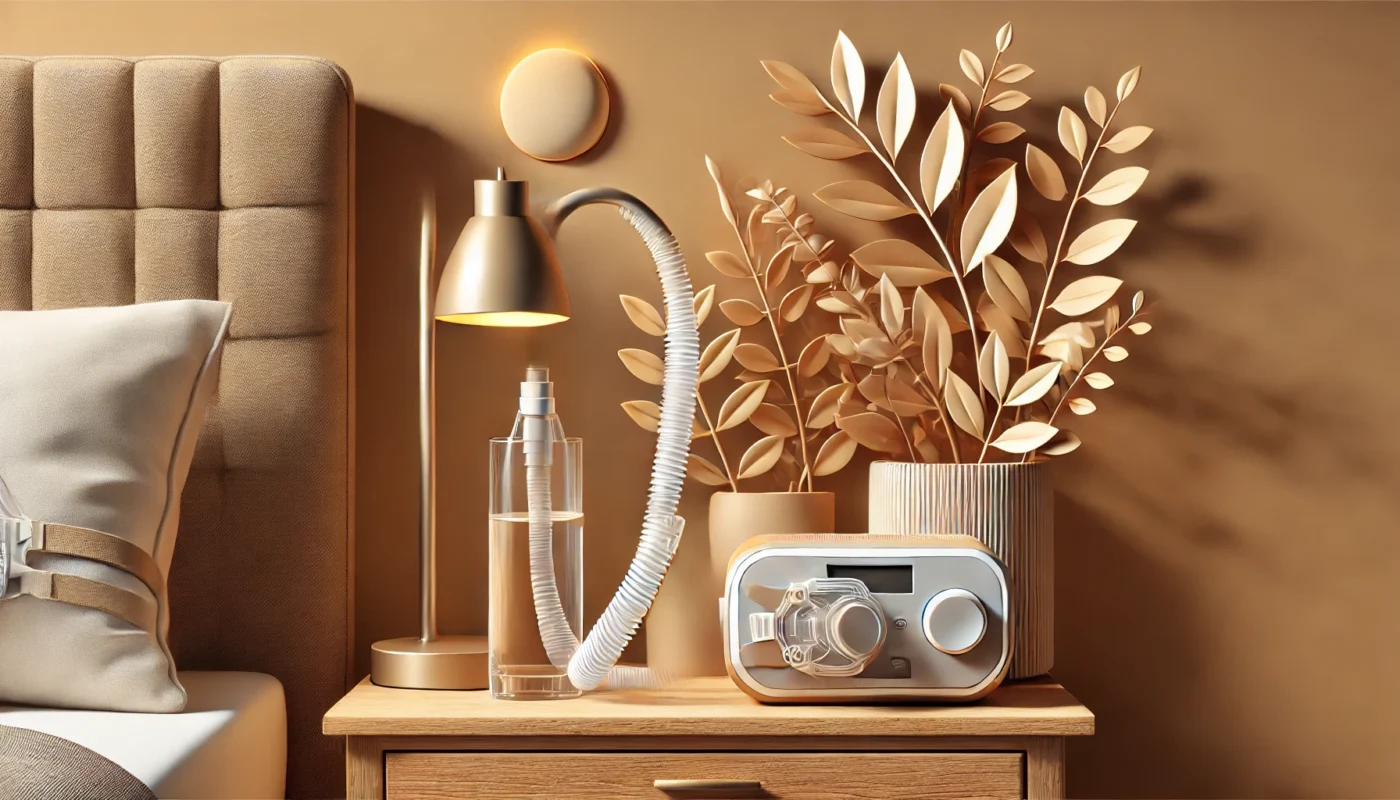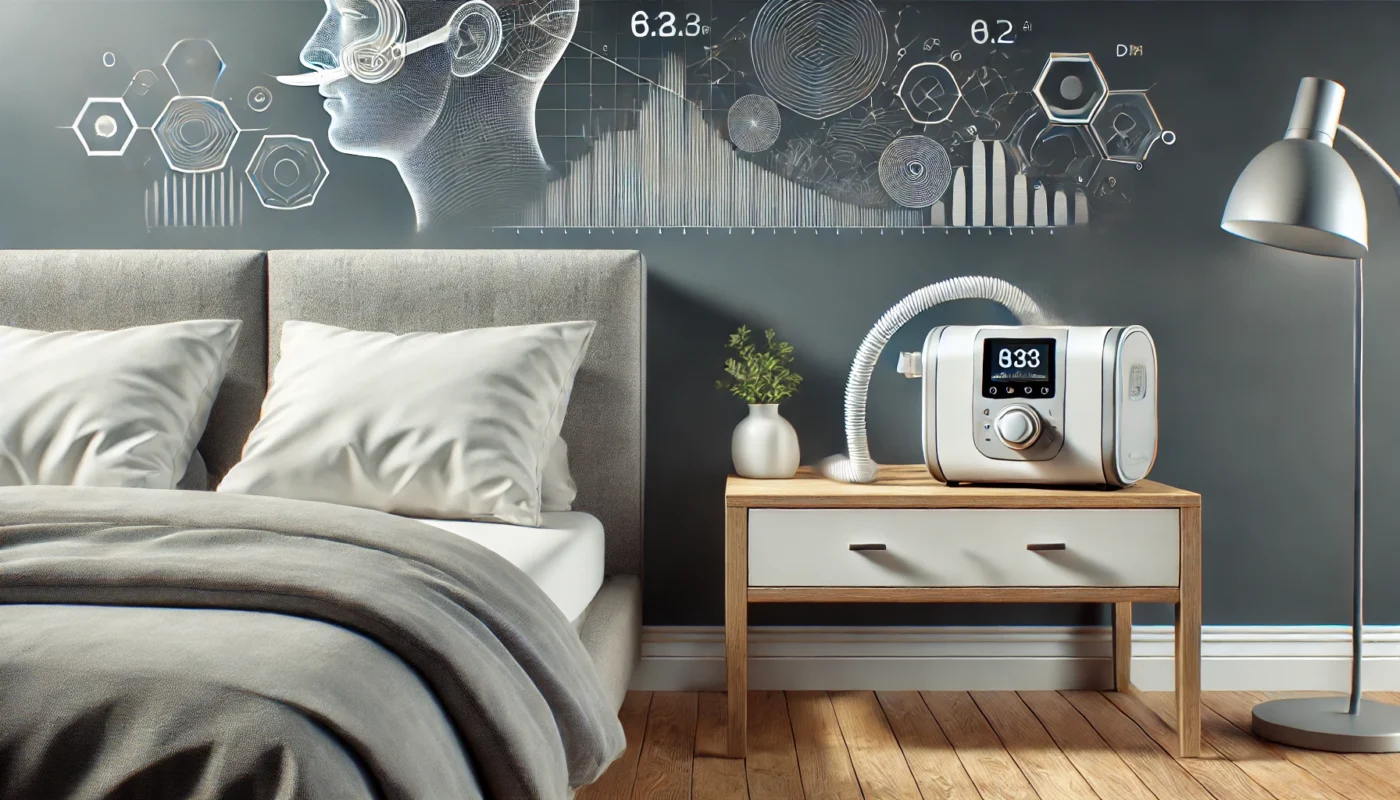Hypertension, or high blood pressure, is a pervasive health concern affecting nearly half of adults worldwide, according to the World Health Organization (WHO). While it is well-known as a leading cause of cardiovascular diseases, strokes, and kidney failure, many people are unaware of the link between hypertension and sleep apnea. Obstructive sleep apnea (OSA), a condition marked by repeated interruptions in breathing during sleep, has been strongly associated with persistent and difficult-to-treat high blood pressure. Fortunately, treating sleep apnea with specialized devices, such as continuous positive airway pressure (CPAP) machines, can significantly improve sleep quality and lower blood pressure levels, ultimately reducing cardiovascular risks.
This article explores the relationship between sleep apnea and hypertension, the mechanisms behind their connection, and how sleep apnea devices can play a vital role in managing high blood pressure.
You May Also Like: Hypertension Clinical Trials: Should You Consider Participating?
Understanding Sleep Apnea and Its Impact on Health
What Is Sleep Apnea?
Sleep apnea is a common sleep disorder in which breathing repeatedly stops and starts during sleep. The most prevalent form is obstructive sleep apnea (OSA), which occurs when the throat muscles intermittently relax, blocking the airway. This results in reduced oxygen levels, frequent awakenings, and poor sleep quality.
Symptoms of Sleep Apnea:
- Loud snoring
- Gasping or choking during sleep
- Excessive daytime sleepiness
- Morning headaches
- Difficulty concentrating or memory problems
Prevalence of Sleep Apnea:
It is estimated that 25 million adults in the United States suffer from obstructive sleep apnea, with many cases undiagnosed. The prevalence is even higher in individuals with hypertension, particularly resistant hypertension, a condition where blood pressure remains high despite the use of three or more antihypertensive medications.

The Link Between Sleep Apnea and Hypertension
How Sleep Apnea Contributes to High Blood Pressure
Sleep apnea exerts significant stress on the cardiovascular system through several physiological mechanisms:
- Sympathetic Nervous System Overactivation:
During apnea episodes, the body responds to reduced oxygen levels by activating the sympathetic nervous system, leading to the release of stress hormones like adrenaline. This causes blood vessels to constrict, resulting in elevated blood pressure. - Chronic Inflammation and Oxidative Stress:
Sleep apnea promotes systemic inflammation and oxidative stress, which damage blood vessels and increase vascular resistance, contributing to hypertension. - Disrupted Sleep Architecture:
Fragmented sleep caused by apnea episodes prevents the body from achieving restorative deep sleep stages, which are essential for regulating blood pressure. - Nocturnal Hypertension:
Sleep apnea often leads to nocturnal hypertension, where blood pressure remains elevated during sleep. This condition is a strong predictor of cardiovascular events and kidney damage.
Evidence Supporting the Connection
Numerous studies have highlighted the strong correlation between sleep apnea and hypertension:
- A landmark study in The New England Journal of Medicine (2000) found that individuals with moderate to severe sleep apnea were three times more likely to develop hypertension than those without the condition.
- Research in Hypertension (2018) demonstrated that treating sleep apnea with CPAP therapy significantly lowered systolic and diastolic blood pressure, particularly in patients with resistant hypertension.

Sleep Apnea Devices: A Key to Managing Hypertension
Continuous Positive Airway Pressure (CPAP) Therapy
CPAP is the most widely used and effective treatment for obstructive sleep apnea. The device delivers a continuous stream of pressurized air through a mask, preventing airway collapse and maintaining steady breathing throughout the night.
Benefits of CPAP for Hypertension:
- Reduced Sympathetic Activity:
CPAP eliminates apnea episodes, reducing the overactivation of the sympathetic nervous system and lowering blood pressure. - Improved Oxygenation:
By maintaining consistent airflow, CPAP ensures adequate oxygen levels, reducing hypoxic stress on the cardiovascular system. - Better Sleep Quality:
Restorative sleep achieved with CPAP normalizes circadian blood pressure patterns, reducing nocturnal hypertension.
Evidence:
A meta-analysis published in The Journal of Clinical Sleep Medicine (2015) showed that hypertensive patients using CPAP experienced an average reduction of 4–7 mmHg in systolic blood pressure, a clinically meaningful improvement.
Automatic Positive Airway Pressure (APAP) Devices
APAP machines adjust the pressure delivered based on the user’s breathing patterns, offering a more personalized and comfortable experience compared to standard CPAP devices.
Advantages for Hypertension Management:
- Automatically responds to changes in airway resistance, ensuring effective treatment throughout the night.
- Improved compliance due to enhanced comfort, leading to better blood pressure control.
Bilevel Positive Airway Pressure (BiPAP) Machines
BiPAP devices provide two pressure levels: higher pressure during inhalation and lower pressure during exhalation. This makes them suitable for patients who have difficulty tolerating CPAP or require higher pressure settings.
Hypertension Benefits:
- Enhanced oxygen delivery reduces the frequency of apnea episodes.
- Effective for patients with more severe forms of sleep apnea or comorbid conditions like obesity hypoventilation syndrome.
Oral Appliances
Oral appliances are custom-fitted devices that reposition the jaw or tongue to keep the airway open during sleep. They are typically recommended for patients with mild to moderate sleep apnea or those who cannot tolerate CPAP.
Effectiveness:
While not as effective as CPAP, oral appliances can still reduce apnea severity and improve blood pressure in select cases.
Emerging Technologies for Sleep Apnea and Hypertension
- Hypoglossal Nerve Stimulation (HNS):
HNS involves the implantation of a device that stimulates the hypoglossal nerve, which controls tongue movements, to prevent airway collapse. - Adaptive Servo-Ventilation (ASV):
ASV is an advanced device designed for patients with central sleep apnea. It adjusts airflow dynamically to ensure stable breathing patterns. - Wearable Sleep Monitors:
Devices that track sleep and apnea events in real-time allow for better monitoring and adjustment of treatment strategies.
The Long-Term Benefits of Treating Sleep Apnea
Addressing sleep apnea not only improves sleep quality but also has profound benefits for cardiovascular health:
- Sustained Blood Pressure Reduction:
Studies show that treating sleep apnea can lower systolic and diastolic blood pressure by 5–10 mmHg, reducing the risk of heart attacks and strokes. - Improved Heart Function:
Effective treatment reduces strain on the heart, lowering the risk of atrial fibrillation, heart failure, and other cardiovascular complications. - Enhanced Quality of Life:
Restorative sleep achieved with sleep apnea devices alleviates daytime fatigue, improves mood, and enhances cognitive function.

The Role of Supplements in Supporting Sleep and Cardiovascular Health
Nutritional supplements can complement sleep apnea treatments by addressing inflammation, oxidative stress, and vascular health. Below are five evidence-based supplements for hypertension management:
1. Omega-3 Fatty Acids
Omega-3s reduce inflammation and improve endothelial function, benefiting both blood pressure and cardiovascular health. A meta-analysis in Hypertension (2018) reported reductions in systolic blood pressure by 4 mmHg with omega-3 supplementation.
2. Hibiscus Extract
Hibiscus promotes nitric oxide production, enhancing vascular relaxation. Research in The Journal of Nutrition (2010) showed that hibiscus tea reduced systolic blood pressure by 6 mmHg.
3. Magnesium Glycinate
Magnesium promotes vascular relaxation and reduces blood pressure. A study in Magnesium Research (2016) found that magnesium supplementation reduced systolic blood pressure by 5 mmHg.
4. Coenzyme Q10 (CoQ10)
CoQ10 is a powerful antioxidant that improves mitochondrial function and reduces oxidative stress. A trial in Hypertension Research (2007) demonstrated that CoQ10 supplementation lowered systolic blood pressure by 11 mmHg.
5. Beetroot Powder
Beetroot powder contains nitrates, which are converted into nitric oxide to improve blood flow and reduce blood pressure. A study in Nutrition Journal (2017) found that beetroot supplementation reduced systolic blood pressure by 4 mmHg.

Conclusion
The link between sleep apnea and hypertension underscores the importance of addressing sleep disorders as part of a comprehensive approach to managing high blood pressure. Sleep apnea devices, including CPAP, APAP, and BiPAP machines, have demonstrated remarkable effectiveness in reducing blood pressure, improving oxygenation, and enhancing overall cardiovascular health. Coupled with lifestyle changes, emerging technologies, and supportive nutritional supplements, these treatments offer a multi-faceted strategy for combating hypertension. By recognizing and treating sleep apnea, individuals can achieve better sleep, lower blood pressure, and a reduced risk of life-threatening complications, paving the way for a healthier future.
References
- The New England Journal of Medicine. (2000). Sleep apnea and its impact on hypertension. The New England Journal of Medicine. Retrieved from https://www.nejm.org
- Hypertension. (2018). Effects of CPAP therapy on blood pressure in hypertensive patients. Hypertension. Retrieved from https://www.ahajournals.org
- The Journal of Clinical Sleep Medicine. (2015). CPAP therapy and blood pressure reduction: A meta-analysis. The Journal of Clinical Sleep Medicine. Retrieved from https://jcsm.aasm.org/journal/jcsm
- Magnesium Research. (2016). Magnesium supplementation in hypertensive patients. Magnesium Research. Retrieved from https://www.springer.com
- The Journal of Nutrition. (2010). Vascular benefits of hibiscus tea in hypertensive individuals. The Journal of Nutrition. Retrieved from https://academic.oup.com
Key TERMS for this article:
Sleep Apnea, Hypertension, CPAP Therapy, Blood Pressure Control, Sympathetic Nervous System, Cardiovascular Health, Nutritional Supplements
Relevant and useful TAGS for this article:
Sleep Apnea, Hypertension, Blood Pressure Management, CPAP Machines, Cardiovascular Wellness, Sleep Disorders, Oxidative Stress, Resistant Hypertension, Holistic Health, Sleep and Cardiovascular Health
Important Note: The information contained in this article is for general informational purposes only, and should not be construed as health or medical advice, nor is it intended to diagnose, prevent, treat, or cure any disease or health condition. Before embarking on any diet, fitness regimen, or program of nutritional supplementation, it is advisable to consult your healthcare professional in order to determine its safety and probable efficacy in terms of your individual state of health.
Regarding Nutritional Supplements Or Other Non-Prescription Health Products: If any nutritional supplements or other non-prescription health products are mentioned in the foregoing article, any claims or statements made about them have not been evaluated by the U.S. Food and Drug Administration, and such nutritional supplements or other health products are not intended to diagnose, treat, cure, or prevent any disease.

